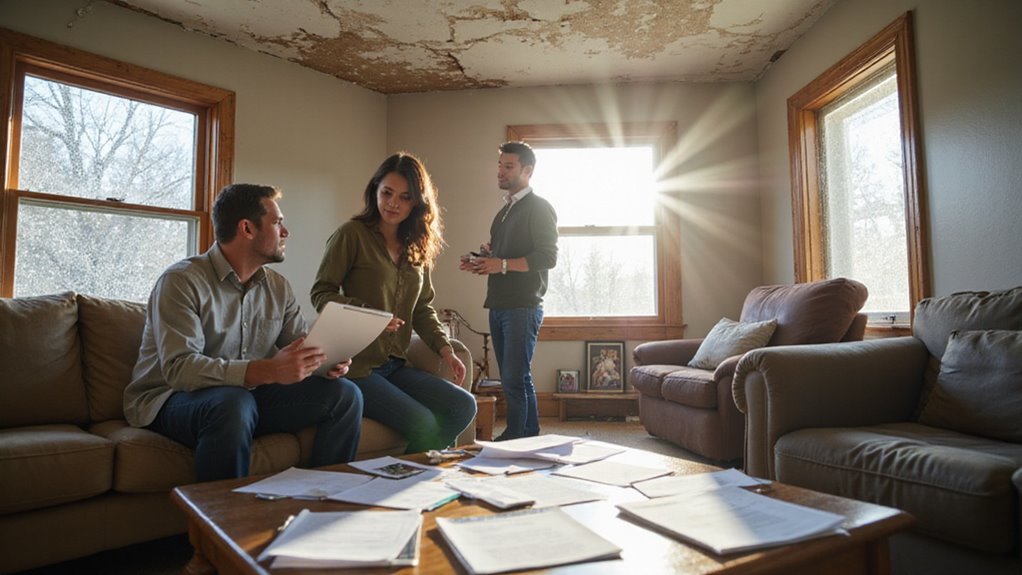Selling a house with water damage is a big challenge. Many homeowners worry about how this damage affects their sale. They often feel unsure about what their home insurance actually covers in this situation.
This uncertainty can make the process stressful. Buyers may hesitate or offer less, and sellers may fear legal or financial trouble. Not knowing what insurance pays for can lead to costly mistakes or missed opportunities. Home insurance usually covers sudden, accidental water damage but not gradual leaks or neglect.
Sellers should check their policy and document all damage carefully. Proper knowledge and preparation can help you protect your interests and get a better outcome. This blog will guide you through the process and help you solve the challenges of selling a water-damaged house.
Key Takeaways
- Home insurance typically covers sudden water damage from burst pipes, accidental overflows, roof leaks, or appliance failures—not gradual leaks or pre-existing issues.
- Flood damage is excluded from standard home insurance policies and requires separate flood insurance coverage.
- Mold remediation is only covered if caused by a sudden, insured event, not from long-term neglect or maintenance issues.
- Proper documentation (photos, repair receipts, inspection reports) is essential for supporting insurance claims and disclosing repairs to buyers.
- Insurers may deny claims for undisclosed, long-term, or pre-existing water damage, affecting both coverage and the home’s sale process.
Understanding Water Damage Types in Homes

Water damage in homes comes in three main types: clean water, gray water, and black water. Each type has different risks and affects insurance and resale. Knowing the type helps you handle the problem correctly.
Understanding clean, gray, and black water damage is key to managing risks and protecting your home’s value and insurance coverage.
Clean water comes from sources like broken pipes or rain. Gray water may have contaminants from appliances like washing machines. Black water is the most dangerous and includes sewage or floodwater. Early discovery and proper inspection can help reveal hidden water problems, preventing further structural or health issues.
If you identify the wrong type of water damage, insurance claims may be delayed or denied. Proper documentation of the source and type helps the claims process. It also makes selling your home easier if you decide to move.
Accurate records help you talk to insurance adjusters more easily. You are more likely to get full coverage if you provide clear information. If you stay organized, you can avoid problems with insurance and future buyers.
Having detailed documentation and transparent disclosure is essential for legal compliance and can protect you from disputes when selling a water-damaged property.
Common Causes of Water Damage Covered by Insurance
Home insurance usually covers water damage from sudden and accidental events. It does not cover problems caused by gradual wear or neglect. Knowing what is covered helps you prepare for renovations or a future property sale.
Insurance often pays for damage from burst pipes, accidental overflows, and sudden roof leaks. Water heater failures and HVAC system leaks are also usually included. If these events happen, you can likely make a claim. If insurance is involved, keep in mind that handling inspection and final documents efficiently can help you avoid delays in the selling process.
Burst pipes can delay renovations if not fixed quickly. Accidental overflow from tubs or appliances may lower your property appraisal. Sudden leaks after storms need fast repairs to avoid further damage.
Water heater bursts can damage floors and walls. HVAC leaks require inspection to prevent mold or bigger repairs. If your damage matches these causes, your insurance might help cover costs.
A property’s condition and its effect on sale speed is important to consider, as homes that have been well-maintained or quickly repaired after water damage tend to sell faster in the Virginia housing market.
Exclusions: What Home Insurance Typically Won’t Cover

You should know that most home insurance policies exclude coverage for pre-existing water damage and issues caused by gradual leaks. Insurers typically view these as maintenance problems that fall under your responsibility, not sudden accidents. Understanding these exclusions is crucial when selling a water-damaged house, as buyers and insurers will scrutinize the source and timeline of the damage.
Taking proactive steps like decluttering and depersonalizing your home can make it easier to identify and document new damage, as well as present a cleaner slate for buyer inspections. It’s also important to remember that proper disclosure of violations and water-related issues can not only fulfill legal obligations but also minimize potential disputes with future buyers.
Pre-Existing Damage Exclusions
Home insurance does not cover damage that existed before you bought the policy. This includes any water damage from before your coverage started. Insurers want to protect against new, sudden problems only.
If you are selling a house with visible water problems, insurance will not cover those issues. Insurers expect you to tell them about all known damage during the application process. Hiding damage can cause your policy to be cancelled and make selling your home harder.
Insurers may ask for professional proof of when the water damage happened. If you cannot show it happened after your policy began, your claim will likely be denied. Always understand these rules so you know what to expect when selling your home.
Gradual Water Leaks
Home insurance does not cover gradual water leaks. If a leak develops slowly, your policy will likely not pay for the damage. Insurers see these issues as problems that should have been maintained.
Many people think home insurance covers slow leaks, but this is a myth. Insurance only covers sudden and accidental water damage. Claims for long-term leaks are usually denied.
Flood damage is also not covered under standard home insurance. Gradual leaks and flood damage are both excluded. To avoid problems, fix small leaks as soon as you notice them.
Always review your insurance policy to understand what is and is not covered. If you have questions, ask your insurance agent. Taking care of your home can help prevent costly repairs later.
The Importance of Timely Damage Reporting
Timely damage reporting is important because it helps protect your insurance claim. If you report water damage quickly, you start the claim process right away. Insurance companies often require fast reporting to approve your claim. Delays in reporting could make you lose coverage or get less money. If you notify your insurer as soon as you find the damage, they can inspect the problem and suggest repairs. Quick action can also stop more damage from happening to your home.
Proper documentation, such as repair records and damage reports, can further support your claim and provide important proof for your insurer. If you follow these steps, you show you are a responsible homeowner. Most insurance policies expect you to act fast in these situations. Timely reporting makes your claim stronger and helps keep your property safe. If you’re considering a direct sale, companies that purchase houses in any condition can offer a streamlined process to relieve you from costly repairs and time-consuming paperwork.
How Pre-Existing Water Damage Impacts Coverage

Pre-existing water damage often makes it hard to get insurance coverage. Insurers usually refuse claims if the damage was already there before a new problem happened. If you have old issues, your policy may not pay for new damage.
Insurance companies look closely at past water damage, especially if you want to sell your home. If you ignored leaks or did not fix plumbing problems, your claim will likely be denied. Flood insurance also does not cover damage that happened before the flood. In these situations, houses bought as-is by local cash buyers can prevent sellers from dealing with denied claims or the stress of major repairs before closing.
If you report leaks late or only do part of the repairs, you may get less money. Mold from old water damage is also not covered by most policies. If you want the best chance of coverage, fix all issues and keep good records. Sellers should be aware that property liens can further complicate the sales process and influence both insurance coverage and the ability to transfer a clear title.
Distinguishing Between Sudden and Gradual Damage
Insurance companies treat sudden and gradual water damage differently. Sudden damage, like a burst pipe, is usually covered. Gradual damage from slow leaks is not.
Policies usually pay for unexpected damage only. Many people mistakenly think all water damage is covered. This is a common myth. When considering market conditions, sellers might face additional challenges if their property’s value is affected by uncovered water damage.
Gradual damage often results from poor maintenance or hidden leaks. Standard home insurance rarely covers this type of loss. Insurers expect homeowners to fix small problems early.
Adjusters will check how and when the damage happened if you file a claim. Good records and clear documentation are important. Knowing these rules can help you avoid denied claims.
If you’re selling a house after divorce in Virginia, proper documentation—including damage reports and repair records—can also protect you during the sale process.
Mold Remediation and Insurance Policies

Home insurance often provides limited coverage for mold removal. Most policies do not cover mold caused by long-term neglect. Mold from sudden events, like a burst pipe, may be covered. Insurers will look at what caused the mold before paying for removal. They often set a limit on how much they will pay. Policy details can vary, so check the mold coverage in your plan.
In some cases, proper documentation and acting quickly can be critical in ensuring a claim is approved or avoiding delays if you need to dispute a denial with your insurer. If you do not fix water damage quickly, your claim could be denied. Always act fast and keep good records of any damage. Quick action and documentation can help if you file a mold claim. When mold is related to disclosure requirements, failing to properly inform buyers can result in legal and negotiation challenges if you’re selling your house as-is in Virginia.
Required Documentation for Water Damage Claims
To file a water damage claim, you need clear and complete documentation. Take photos and videos of all damaged areas. Make sure each photo and video is date-stamped.
Write down when and how the water damage happened. Save all receipts for repairs or temporary stays. If you have any emails or messages with repair workers or emergency services, keep those too.
Keep a copy of your insurance policy and check what is covered. If you organize your records, your claim will move faster. Good documentation can help you get a fair payment. Reviewing your water damage records is also helpful if you later decide on alternative selling options for your home, as these records can affect buyers’ perceptions and negotiations.
Working With Adjusters During the Selling Process

When working with insurance adjusters as you sell a water-damaged house, you need to communicate the extent of damage accurately and supply detailed records of every restoration step. Maintain organized documentation, including photos, invoices, and repair timelines, to support your claim. Approach settlement negotiations strategically to ensure the final amount reflects both the damage and your remediation efforts.
Communicating Damage Details Clearly
Clear communication helps insurance adjusters understand water damage details. Accurate information helps them assess your claim quickly and fairly. Simple, direct facts prevent misunderstandings during the selling process.
If your property is in a flood zone, state this clearly. You should explain if the damage is from flooding or another source. Insurance policies may cover each situation differently.
Be sure to note the date, cause, and extent of the damage. Describe which areas and materials were affected. If you have special insurance riders, mention these as well.
You should be ready to answer follow-up questions from adjusters. If you respond quickly, your claim may process faster. This approach can reduce confusion and delays.
Documenting Restoration Efforts Thoroughly
Insurance companies need clear proof for your water damage claim. You should record each restoration step in detail. If you do this, your insurer is more likely to accept your claim.
Take photos before, during, and after every repair. Save all receipts and any invoices from contractors. If you keep these, you can show exactly what you spent and what was fixed.
Write down all important conversations about the restoration process. Keep a log of decisions and agreements made. If requested, give this information to the insurance adjuster.
Proper documentation proves you have done your part as a homeowner. It also helps the adjuster review your claim quickly. If you stay organized, you avoid missing important details.
| Documentation Type | Purpose |
|---|---|
| Photos/Videos | Shows the damage and repair progress |
| Receipts/Invoices | Confirms spending within policy limits |
| Contractor Reports | Gives expert evidence of repairs |
| Communication Logs | Tracks decisions and repair timelines |
Negotiating Settlement Amounts Effectively
Negotiating settlement amounts requires preparation and clear communication. If you follow a step-by-step plan, you can get a fair payout. This is especially helpful if you plan to sell a house with water damage.
Start by gathering strong evidence, such as photos, receipts, and repair quotes. If the adjuster’s report misses any damage, point it out with proof. You should read your policy to know what is covered and what is not.
If you get a low offer, don’t accept it right away. Always respond politely and back up your requests with facts. If you stay organized and firm, you can often improve your settlement and speed up your home sale.
Disclosing Water Damage to Potential Buyers
If you are selling a house with past water damage, you must tell buyers about it. Full and honest disclosure is required by law. Hiding water damage can cause serious legal and financial problems.
Some people think small repairs or paint can hide water damage, but this is not true. If you try to hide damage, you risk getting into trouble later. Buyers and insurance companies often ask for proof that repairs were done properly.
You should keep records of any repairs and insurance claims. These documents show you have fixed the problem the right way. Sharing them helps buyers trust you and makes selling your home easier.
The Role of Home Insurance in Real Estate Transactions
Home insurance is important in real estate deals for homes with water damage. Insurance history affects how buyers and lenders view the property. If the home has past claims, buyers may worry about future costs.
Lenders often ask for proof that the home can be insured. If you cannot get insurance, the sale may not go through. Some lenders may reject a mortgage if the home is in a high-risk flood zone.
Flood zones can mean higher insurance costs and mandatory coverage. High premiums can make buyers less interested or offer less money. If you keep insurance costs low, you may attract more buyers.
If you are selling, you should know how insurance affects your sale. Buyers will likely check for past claims or high premiums. Understanding these factors helps you handle negotiations better.
Steps to Take Before Listing a Water-Damaged Home
Before listing a water-damaged home, you must fix existing problems first. This protects your interests and helps with a smoother sale. Addressing damage early can avoid future issues. Fixing water damage before listing your home protects your interests and ensures a smoother, more successful sale.
You should document all water damage. Contact your insurance company to check your coverage. If you skip this, you may face out-of-pocket costs.
Repair any structural damage and replace ruined materials, such as drywall or flooring. Make sure plumbing and electrical systems work safely. If these areas are unsafe, fix them before listing.
Check the yard for drainage problems that may have caused water damage. Restore damaged landscaping to improve curb appeal. A well-kept yard can attract more buyers.
Get professional inspections to verify repairs. Keep detailed records of all repairs and updates. If you do this, buyers will feel more confident in your home.
Negotiating Repairs and Insurance Payouts
Negotiating repairs and insurance payouts means discussing costs with your insurer and buyers after water damage. You need to know what your insurance covers and what it does not. Insurance premiums might go up depending on your claim.
If you want to get the most from your insurance, start by getting repair estimates from licensed contractors. You should keep records of all repairs and claims. Present these documents when talking to your insurer or any buyer.
Insurers may offer a lower payout, so refer to your policy to support your claim. If you have proof of damages and repairs, you can negotiate better. Buyers will want to know about all past and current issues.
You must share all details about water damage with buyers to stay honest. If you are clear and organized, negotiations are smoother. This process helps protect your interests.
Tips for Selling a Home After Water Damage
When selling a home with a history of water damage, you need to fully disclose all incidents to maintain trust and legal compliance. Focus on completing the most critical repairs to reassure buyers and preserve your property’s value. Make sure you highlight any insurance coverage or claims that have addressed the damage, as this demonstrates responsible ownership and mitigates buyer concerns.
Disclose All Past Damage
You must tell buyers about all past water damage. This builds trust and keeps you safe from legal trouble. If you hide damage, the sale could fall through.
List every time your home had water damage. Include when it happened and what caused it. If there are repair records, you should share them.
Give buyers any documents for repairs or insurance claims. You should also show inspection reports. If there are still problems like mold or smells, say so.
Let buyers know about any steps you took to stop future damage. This could include fixing roofs or updating appliances. Clear information helps buyers make good choices.
Prioritize Essential Repairs
Focus on essential repairs first to protect your home’s value and attract buyers. If you address the most important issues, you can avoid bigger problems later. Start by fixing anything that affects the structure or safety of your home.
Structural problems and water damage should be your top priorities. These issues often cause buyers to walk away from a sale. Always check for foundation cracks, leaks, and mold.
Many people think insurance covers every type of water or mold damage, but this is not true. If you have questions, ask your insurance provider what is included in your policy. Never assume minor fixes are unimportant because small problems can turn into larger ones.
Use this guide to help decide which repairs to make first:
| Essential Repair | Why It Matters | Common Myths |
|---|---|---|
| Foundation repairs | Prevents future damage | Insurance covers all |
| Mold remediation | Health and safety | Mold always covered |
| Roof leaks | Stops further issues | All leaks insured |
| Electrical fixes | Reduces fire risk | Small fixes unimportant |
| Wall restoration | Boosts visual appeal | Cosmetic only |
Highlight Insurance Coverage
Buyers need to know what your home insurance covers. Sharing this information helps them feel more secure about making an offer. If you clearly explain your insurance coverage, you can build trust and avoid confusion.
You should show your current insurance policy and any recent claims. If there are limits or exclusions, point them out clearly. Buyers want to know if past water damage is fully covered or not.
If repairs were paid by insurance or out-of-pocket, explain this difference. You can help buyers by correcting common insurance myths, such as all water damage being covered. Providing honest details will help buyers make informed decisions.
Conclusion
If you want to sell a water-damaged house, you need to understand your home insurance coverage. If you clearly document repairs and disclose all damage, you will gain buyer trust and avoid future disputes. If you prepare well, you can make the sales process easier and more profitable.
If you would rather avoid the hassle of traditional selling, we buy houses for cash in any condition. If you choose a cash sale, you can skip repairs and close faster. If you want a smooth and simple process, this is a great option.
If you are ready to sell your water-damaged house, we at Align Real Estate Solutions can help. If you contact us today, we will give you a no-obligation cash offer. If you want a hassle-free sale, let Align Real Estate Solutions guide you every step of the way.
Author
-

Zach Koops is co-founder and Real Estate Success Manager at Align Real Estate Solutions, serving homeowners across Virginia since 2024. With a passion for real estate and a heart for people, Zach has built his career around helping sellers navigate tough situations—foreclosure, inheritance, relocation, repair-overload—with clarity and compassion. He’s known for being straightforward, steady under pressure, and deeply invested in relationships. Outside of work, he spends his time as a husband and father, enjoys the outdoors in Shenandoah Valley, loves singing on stage, and constantly seeks growth through reading and new experiences.









